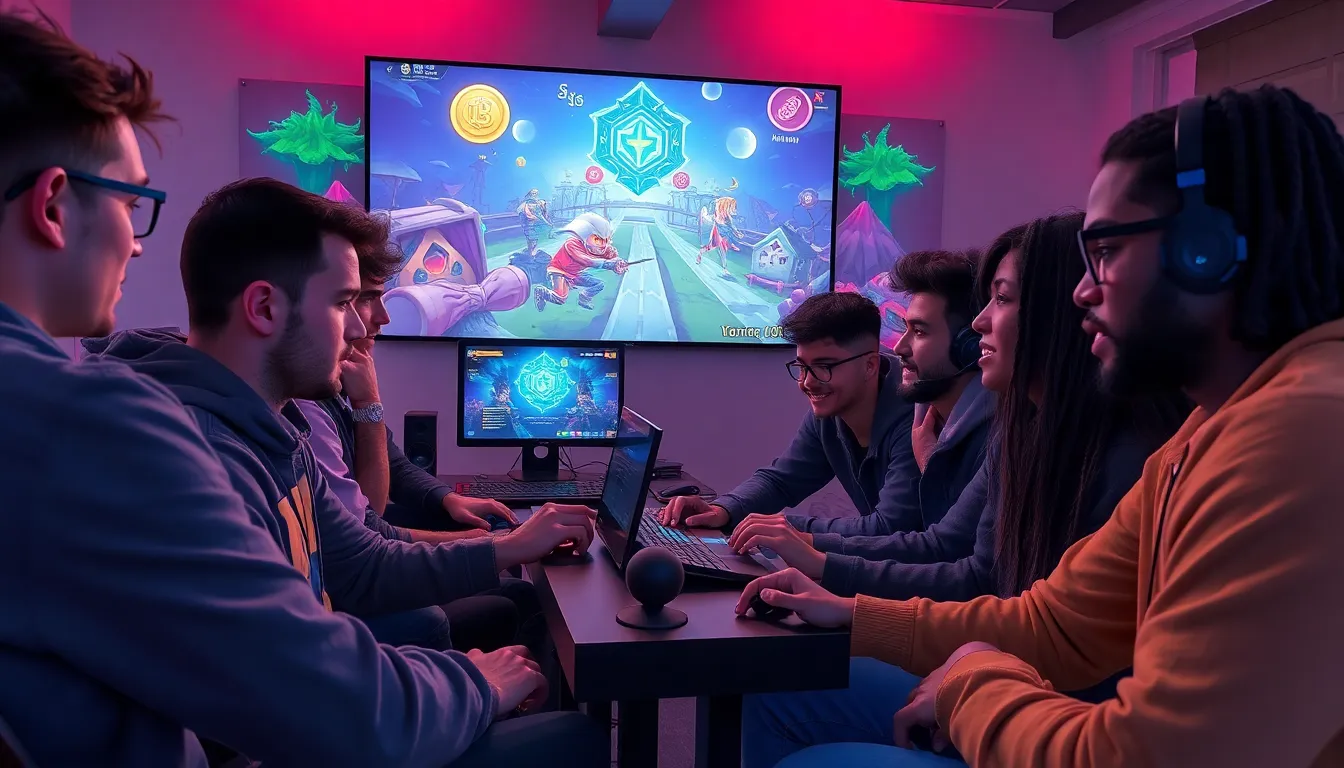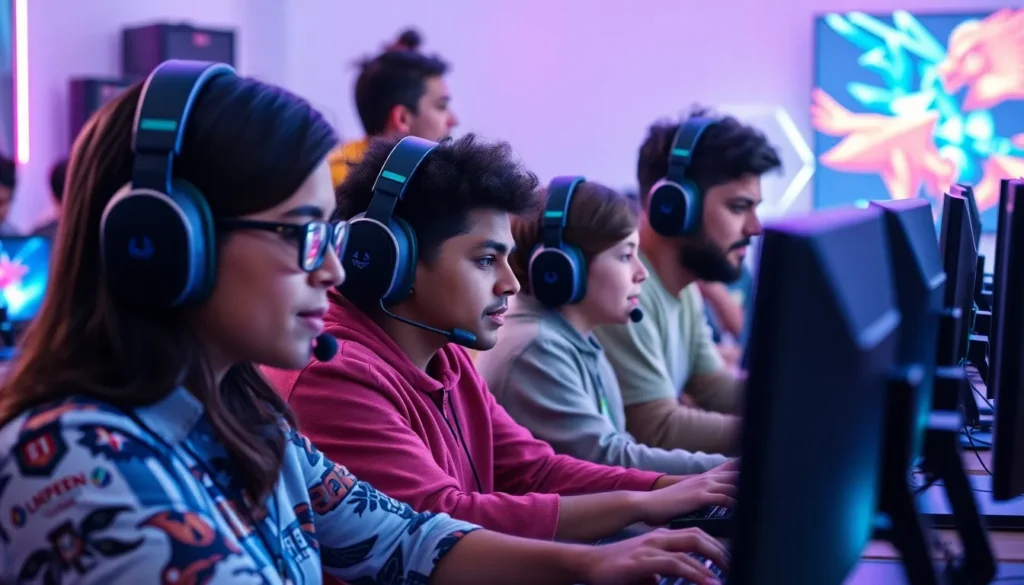In a world where gaming is evolving faster than a character can level up, Web3 game development companies are leading the charge into uncharted territory. These innovative firms are not just creating games; they’re crafting immersive experiences that let players own their digital assets and engage in decentralized economies. Picture this: you could finally sell that rare sword you’ve been hoarding, and it’s not just a fantasy anymore!
As blockchain technology reshapes the gaming landscape, developers are tapping into new possibilities that promise to revolutionize how players interact. With a sprinkle of creativity and a dash of tech-savvy, these companies are setting the stage for a gaming renaissance. So, if you’re ready to dive into a universe where your in-game achievements hold real-world value, buckle up—Web3 is here to change the game.
Overview of Web3 Game Development Companies
Web3 game development companies lead the charge in redefining gaming experiences through blockchain technology. These firms prioritize player ownership of digital assets, allowing individuals to buy, sell, and trade in-game items seamlessly. Innovative features such as non-fungible tokens (NFTs) provide unique identifiers for digital assets, enhancing rarity and value.
Companies in this space foster decentralized economies that empower players. They create environments where participants earn real-world rewards, transforming traditional gaming paradigms. Many Web3 games incorporate play-to-earn models, enabling players to monetize their skills and time.
Collaboration and community engagement are pivotal for these companies. They often involve gamers in the development process through feedback mechanisms, ensuring that titles resonate with audiences. Transparency in governance is maintained by involving communities in decision-making processes, often through decentralized autonomous organizations (DAOs).
Investment in Web3 gaming continues to grow substantially. Numerous startups attract venture capital, highlighting the rising interest in this innovative sector. Research shows that the global blockchain gaming market is projected to reach $50 billion by 2025, demonstrating the trend’s momentum.
Developers emphasize user experience by integrating immersive gameplay with blockchain mechanics. The interplay of rich storytelling and engaging graphics enhances player retention, making these games more appealing. Companies recognize that successful titles depend on balancing entertainment with the benefits of decentralized platforms.
Calls to action within these games drive further engagement, encouraging players to explore and participate actively. Continuous technological advancements will likely yield new opportunities, further shaping the landscape of game development.
Key Features of Web3 Game Development

Web3 game development companies revolutionize gaming with several key features that enhance player experience and ownership.
Blockchain Integration
Blockchain integration serves as the backbone of Web3 gaming. It allows players to securely own digital assets through unique identifiers. Players can buy, sell, and trade in-game items without intermediaries. Non-fungible tokens (NFTs) increase asset rarity, making ownership more valuable. Transactions occur transparently on the blockchain, ensuring authenticity and trust among users. This technology eliminates concerns about fraud, as players can easily verify their assets and transactions. Seamless blockchain integration elevates gameplay while fostering a sense of responsibility among players.
Decentralized Gaming Ecosystems
Decentralized gaming ecosystems empower players in innovative ways. Game developers often involve players in development through decentralized autonomous organizations (DAOs). This approach encourages collaboration, giving gamers a voice in decisions that affect their experiences. Play-to-earn models enhance engagement, allowing individuals to monetize their skills and time within the games. In these ecosystems, the focus shifts from centralized control to community-driven initiatives. Players not only participate in gameplay but also shape the future of the games they love. This transformative shift strengthens the connection between players and the gaming environment.
Leading Web3 Game Development Companies
Web3 game development companies are at the forefront of an exciting transformation in the gaming industry. These firms create innovative experiences that empower players and reshape the digital landscape.
Company A: Innovations and Impact
Company A leverages blockchain technology to create unique gaming environments. Innovations such as play-to-earn models attract player participation and investment. By integrating non-fungible tokens (NFTs), Company A enhances asset ownership, allowing users to trade in-game items securely. Their initiatives promote community engagement through decentralized decision-making. Notably, their games have expanded to include user-generated content, further enriching the player experience. Industry impact remains significant as Company A paves the way for future developments in Web3 gaming.
Company B: Success Stories and Portfolio
Company B boasts an impressive portfolio of successful titles that exemplify Web3 principles. Popular games feature a combination of immersive gameplay and blockchain integration, leading to a strong player base. Noteworthy successes include partnerships with top-tier brands, enhancing visibility and credibility in the market. Players embrace opportunities to earn real-world value through in-game achievements. Each title represents a commitment to user experience and innovation, ensuring players stay engaged. Overall, Company B’s success stories highlight the positive trajectory of Web3 gaming and the endless possibilities ahead.
Challenges in Web3 Game Development
Web3 game development presents unique challenges that companies must navigate. Technical limitations and market adoption issues significantly impact the development landscape.
Technical Limitations
Developers face considerable technical hurdles when building Web3 games. Scalability issues arise as blockchain networks struggle to handle high user volumes without delays. Smart contracts, the backbone of many game mechanics, can complicate development due to the need for rigorous testing and security measures. Interoperability between different blockchain platforms often proves difficult, limiting asset transfer and gameplay integration. Performance challenges can affect user experience, leading to frustrations if the technology does not meet player expectations.
Market Adoption
Market adoption remains a significant hurdle for Web3 game development companies. Many traditional gamers remain skeptical of blockchain technology and its associated complexities. Although the blockchain gaming market is projected to reach $50 billion by 2025, convincing players to transition from conventional gaming models requires strategic approaches. User education plays a crucial role in this shift, especially regarding benefits like asset ownership and play-to-earn opportunities. Companies must also engage with communities to cultivate trust and enthusiasm for new game features and mechanics. Without effective strategies, widespread acceptance may take longer, delaying the full potential of Web3 gaming.
Future Trends in Web3 Game Development
Innovations in Web3 game development are set to shape the future of gaming. The rise of decentralized finance (DeFi) integration within gaming platforms enhances monetary interactions for players. Game developers are adopting more immersive experiences, incorporating virtual and augmented reality technologies into gameplay. Blockchain interoperability emerges as a crucial trend, allowing assets from one game to seamlessly transfer to another, improving player engagement.
NFTs will continue to play a pivotal role in defining digital asset ownership. Developers are exploring dynamic NFTs, which change based on player interactions, increasing the asset’s uniqueness and value. Strong community involvement becomes essential, with more games allowing players to actively contribute to game design and narrative. As decentralized autonomous organizations (DAOs) gain traction, player voices will shape gaming ecosystems and in-game economies.
Play-to-earn mechanisms are evolving with richer in-game economies. Developers will create more diverse earning options, allowing players to monetize various skills and gameplay styles. Enhanced user experience features will prioritize intuitive interfaces, making participation in blockchain gaming accessible to traditional gamers.
Education on blockchain technology will play a significant role in market adoption. Companies are likely to invest in strategies that demystify Web3 concepts for potential users, improving acceptance rates within their target audiences. Collaborative efforts between traditional gaming companies and Web3 developers may bridge the gap, fostering a smoother transition into decentralized gaming environments.
Optimizing security measures will also be critical, as the demand for secure transactions grows. Enhanced protocols will help mitigate risks associated with digital asset ownership, bolstering player confidence in the technology. The future of Web3 game development promises to be vibrant, driven by innovation and a focus on community-centered experiences.
Conclusion
The landscape of gaming is undeniably shifting thanks to Web3 game development companies. By prioritizing player ownership and integrating blockchain technology, these firms are creating immersive experiences that empower gamers. The future holds exciting possibilities with advancements in decentralized finance and augmented reality, promising even more engaging gameplay.
As the industry evolves, addressing challenges like market adoption and technical limitations will be crucial. The collaboration between traditional gaming and Web3 developers could pave the way for broader acceptance. With a focus on community involvement and education, the potential for Web3 gaming to redefine the industry is immense. The journey ahead is filled with innovation and opportunity, making it an exciting time for both developers and players alike.



